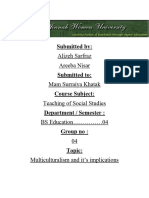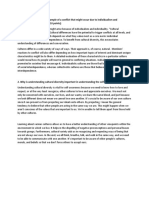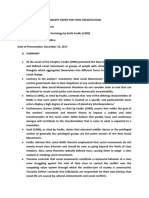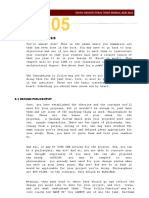UCSP Crap-1
UCSP Crap-1
Uploaded by
wynneanezkaCopyright:
Available Formats
UCSP Crap-1
UCSP Crap-1
Uploaded by
wynneanezkaCopyright
Available Formats
Share this document
Did you find this document useful?
Is this content inappropriate?
Copyright:
Available Formats
UCSP Crap-1
UCSP Crap-1
Uploaded by
wynneanezkaCopyright:
Available Formats
Leader of the Opposition (LO – 1st) Constructive -- 8 minutes
- [Introduction]
Opening Statement: "Honorable adjudicators, respected members of the Government,
and distinguished audience, today we stand in opposition to the resolution that cultural
relativism is the root cause of anomie in society. We believe this stance is misguided and
overlooks the true complexities of both cultural relativism and anomie."
Thesis Statement: "Our position is that cultural relativism is not the cause of anomie, but
rather a tool that can promote social cohesion in a diverse society."
- [Counterplan]
Objective: Instead of blaming cultural relativism for societal issues, we propose that embracing
cultural diversity with a framework of shared universal principles is the key to preventing
anomie.
Method: We will refute the Government’s major points, present arguments against the resolution,
and provide evidence supporting our view that cultural relativism can be a force for good.
- [Refute the Government’s major points]
- [Present arguments against the resolution]
1. Cultural Relativism Encourages Respect and Peace:
Cultural relativism helps people understand and respect different cultures, which reduces conflict.
When we respect each other’s differences, society becomes more peaceful and united, not
confused or chaotic.
2. Anomie Comes from Big Social Problems, Not Cultural Differences:
Anomie usually happens because of big problems like economic inequality or sudden social
changes. These things make people feel disconnected and lost. Cultural relativism actually helps
people feel included and understood, which can prevent these feelings.
3. Diversity Makes Society Stronger:
Instead of breaking society apart, cultural relativism allows different cultures to live together in
harmony. This diversity makes society richer and stronger because it includes everyone, rather
than making some groups feel left out.
4. Avoiding the “My Culture is Better” Attitude:
Cultural relativism prevents people from thinking their culture is the best and others are wrong.
This attitude can create divisions and conflict. Instead, cultural relativism encourages people to
talk and understand each other, which strengthens social bonds.
5. Universal Values Can Work with Cultural Differences:
Cultural relativism doesn’t reject universal values like justice or respect. It just means these
values can be understood differently in different cultures. This flexibility helps keep society
stable without losing shared values.
6. Promotes Responsibility and Understanding:
Cultural relativism teaches people to be responsible and understand others’ perspectives. This
makes everyone feel more connected and reduces the chances of social breakdown.
- [Evidences]
1. Cultural Relativism Encourages Respect and Peace
Evidence: Cultural relativism promotes the idea that all cultures have intrinsic value and
encourages respect for cultural diversity. This approach can lead to greater tolerance and reduced
conflict between different cultural groups.
Citation:
Herskovits, M. J. (1972). Cultural Relativism: Perspectives in Cultural Pluralism. New York:
Vintage Books. Herskovits argues that cultural relativism fosters mutual respect and
understanding, which can lead to more peaceful and harmonious interactions among different
cultural groups.
2. Anomie Comes from Big Social Problems, Not Cultural Differences
Evidence: Sociological research indicates that anomie is often linked to major social issues such
as economic inequality, rapid social changes, and the breakdown of traditional social structures
rather than cultural differences alone.
Citation:
Durkheim, É. (1893). The Division of Labour in Society. New York: Free Press. Durkheim’s
work emphasizes that anomie results from the disruption of social norms and institutions,
primarily due to economic and social changes, not from cultural diversity.
3. Diversity Makes Society Stronger
Evidence: Research shows that diversity can strengthen societies by fostering innovation,
improving problem-solving, and enhancing social cohesion through inclusive practices.
Citation:
Page, S. E. (2007). The Difference: How the Power of Diversity Creates Better Groups, Firms,
Schools, and Societies. Princeton: Princeton University Press. Page argues that diversity
enhances societal strength and resilience, contrary to the idea that it leads to fragmentation.
4. Avoiding the “My Culture is Better” Attitude
Evidence: Cultural relativism helps counteract ethnocentrism, the belief that one's own culture is
superior. By encouraging an understanding of cultural differences, it reduces the likelihood of
cultural conflicts and promotes social unity.
Citation:
Geertz, C. (1973). The Interpretation of Cultures. New York: Basic Books. Geertz highlights
how cultural relativism can prevent ethnocentric attitudes and promote greater understanding and
harmony between different cultural groups.
5. Universal Values Can Work with Cultural Differences
Evidence: Cultural relativism allows for the adaptation of universal values to fit different cultural
contexts, facilitating social stability while respecting cultural diversity.
Citation:
Sen, A. (2009). The Idea of Justice. Cambridge: Harvard University Press. Sen discusses how
universal values like justice can be interpreted and implemented in culturally specific ways,
which helps maintain social order without disregarding cultural differences.
6. Promotes Responsibility and Understanding
Evidence: Cultural relativism encourages individuals to consider and understand perspectives
different from their own, fostering empathy and social responsibility, which can contribute to a
more cohesive society.
Citation:
Nussbaum, M. C. (1997). Cultivating Humanity: A Classical Defense of Reform in Liberal
Education. Cambridge: Harvard University Press. Nussbaum argues that understanding
diverse perspectives through cultural relativism promotes empathy and responsibility, which
strengthens social bonds and reduces potential for conflict.
Cultural Relativism - is the position that there is no universal standard to measure cultures by, and that
all cultural values and beliefs must be understood relative to their cultural context, and not judged base d
on outside norms and values. Proponents of cultural relativism also tend to argue that the norms and
values of one culture should not be evaluated using the norms and values of another.
Anomie – According to Durkheim, anomie is a state in which expectations are unclear and the social
system that keeps people functioning has broken down. He believed that anomie, or normlessness, could
result in feelings of deep despair and worthlessness for individuals and makes them feel as if their identity
or role in the society has been deemed worthless or of no value.
RESOLUTION: “Societal Danger: Cultural Relativism is the Root Cause of Anomie in Society”
[Government Argument & Counter Arguments]
Breakdown of a Shared Moral Compass/Universal Values
- Cultural relativism, by rejecting universal moral principles, leads to a society where there is
no common set of values, resulting in confusion and normlessness.
[Counter-Argument]
- The Government claims that cultural relativism erodes universal values. We argue that
cultural relativism does not reject universal values but promotes understanding and tolerance,
which are themselves universal values that strengthen social bonds.
Fragmentation of Social Cohesion
- When cultural relativism is taken to an extreme, it results in societal fragmentation, as
different groups adhere to their own norms, weakening social bonds and leading to anomie.
[Counter-Argument]
- The Government suggests that cultural relativism leads to societal fragmentation. However,
we believe that cultural relativism fosters dialogue and mutual respect, which can actually
enhance social cohesion instead, especially in the multicultural society that we currently live
in.
Moral Ambiguity and Anomie
- Cultural relativism creates moral ambiguity, where individuals lack a clear moral compass,
leading to a sense of directionlessness and the rise of anomie.
[Counter-Argument]
- The Government argues that cultural relativism creates moral ambiguity, leading to anome.
On the contrary, we assert that cultural relativism encourages moral reflection and
adaptability, helping societies to remain cohesive and relevant.
You might also like
- UntitledDocument369 pagesUntitledAlicia Nyberg ErikssonNo ratings yet
- Arkady and Boris Strugatsky Roadside Picnic PDFDocument201 pagesArkady and Boris Strugatsky Roadside Picnic PDFBll94% (18)
- Institutional Discourse: MichaelagarDocument22 pagesInstitutional Discourse: Michaelagarrenkoviki0% (1)
- Somali Studies (1) QaalibDocument96 pagesSomali Studies (1) QaalibAbdirazak Haji HusseinNo ratings yet
- Flightdeck Consulting - Airline Pilot Workbook PDFDocument42 pagesFlightdeck Consulting - Airline Pilot Workbook PDFАртём ОгородиковNo ratings yet
- Rhetorical RationaleDocument2 pagesRhetorical Rationaleapi-249404990No ratings yet
- Derek Walcott-Love After LoveDocument2 pagesDerek Walcott-Love After LoveZainab Batool100% (2)
- UCSP CrapDocument4 pagesUCSP CrapwynneanezkaNo ratings yet
- El Bakkali's Course Pack For Culture and SocietyDocument55 pagesEl Bakkali's Course Pack For Culture and SocietyAbdelkarim BouhNo ratings yet
- EthnocentrismDocument4 pagesEthnocentrismAbdulAhadNo ratings yet
- DecuongfilarDocument23 pagesDecuongfilarNguyễn T. HàNo ratings yet
- ChapterDocument19 pagesChapterHabiba FouadNo ratings yet
- Sociological Analysis of CultureDocument13 pagesSociological Analysis of CultureNathanielManzanero0% (1)
- Unit 1 Chapter 2 USCPDocument50 pagesUnit 1 Chapter 2 USCPDon LimNo ratings yet
- We Live in A Rapidly Changing World SocietyDocument2 pagesWe Live in A Rapidly Changing World SocietyKimberly Mae MenorNo ratings yet
- Ethics Group 5Document4 pagesEthics Group 5Norhaina AtoNo ratings yet
- Pgce Culture, Society and EducationDocument14 pagesPgce Culture, Society and EducationSiphumeze TitiNo ratings yet
- Module 5-Diversity and PluralismDocument31 pagesModule 5-Diversity and Pluralismjaitik nagpalNo ratings yet
- ppt scriptDocument8 pagesppt scripthayahk52No ratings yet
- Cultural RelativismDocument8 pagesCultural Relativismruth honradoNo ratings yet
- Local Media7248563378145217554Document9 pagesLocal Media7248563378145217554Cyrss BaldemosNo ratings yet
- REFLECTION PAPER 3 - Module 3 and 4Document6 pagesREFLECTION PAPER 3 - Module 3 and 4Caburnay, Ma. Mhika Francess P.No ratings yet
- Assignment 1Document10 pagesAssignment 1Sadiya SharminNo ratings yet
- Elements of CultureDocument17 pagesElements of CultureAmit_dkumae100% (3)
- Handout 1 Ucsp G11Document7 pagesHandout 1 Ucsp G11Dyepoy Figs VjoucherNo ratings yet
- Ucsp Q3 M3Document10 pagesUcsp Q3 M3camposojoshua8No ratings yet
- CultureDocument39 pagesCultureAndré TiangcoNo ratings yet
- Chapter 9: The Characteristics of CultureDocument4 pagesChapter 9: The Characteristics of CultureSajid Mehdi100% (1)
- MIDTERM LESSON For Multicultural Diversity in WorkplaceDocument8 pagesMIDTERM LESSON For Multicultural Diversity in WorkplaceAlaiza Maureen B. DalugduganNo ratings yet
- Culture and SocietyDocument23 pagesCulture and SocietyGlecy RazNo ratings yet
- Module 2 - LESSON 1 & 2Document13 pagesModule 2 - LESSON 1 & 2Nicole AndayanNo ratings yet
- Learner'S Packet No. 3 Quarter 1 Understanding Culture Society and PoliticsDocument7 pagesLearner'S Packet No. 3 Quarter 1 Understanding Culture Society and PoliticsRalph NavelinoNo ratings yet
- Ccu PDFDocument120 pagesCcu PDFyunitaNo ratings yet
- Anthropological and Sociological Perspectives On Culture and Society?Document9 pagesAnthropological and Sociological Perspectives On Culture and Society?Sharmaine Paragas FaustinoNo ratings yet
- Cultural Diversity PDFDocument26 pagesCultural Diversity PDFSabrina YatesNo ratings yet
- Differentiate Consensus Theory Theory From Conflict TheoryDocument7 pagesDifferentiate Consensus Theory Theory From Conflict TheoryJC UNGRIANo ratings yet
- Aspect of CultureDocument40 pagesAspect of CultureAngelica BermasNo ratings yet
- Cultural RelativismDocument2 pagesCultural RelativismDesiree BartolomeNo ratings yet
- UCSP Lesson 2 Aspects of Culture PDFDocument32 pagesUCSP Lesson 2 Aspects of Culture PDFMarc CamposNo ratings yet
- EC and SH 1 EthicDocument29 pagesEC and SH 1 EthicRLC TunesNo ratings yet
- Ucsp 2 1Document33 pagesUcsp 2 1irishangelagadinganNo ratings yet
- Sociology 03 Culture+ (2) - 2Document25 pagesSociology 03 Culture+ (2) - 2Tiktok Star'sNo ratings yet
- Sociology NotesDocument18 pagesSociology NotesTabish HamidNo ratings yet
- The Challenge of Cultural Relativism and Global Citizen Values.Document4 pagesThe Challenge of Cultural Relativism and Global Citizen Values.Jhezell OrtegaNo ratings yet
- Chapter 8 The Challenge of Cultural RelativismDocument4 pagesChapter 8 The Challenge of Cultural Relativismmaye labitoriaNo ratings yet
- GEE 3 Midterm Lecture NotesDocument32 pagesGEE 3 Midterm Lecture NotesmanzanoraiNo ratings yet
- Understanding Society and CultureDocument6 pagesUnderstanding Society and CultureSir NajNo ratings yet
- Understanding Society and CultureDocument6 pagesUnderstanding Society and CultureIrfina ImranNo ratings yet
- Mans Social and Cultural BackgroundDocument36 pagesMans Social and Cultural BackgroundAngeline DiazNo ratings yet
- Ucsp Online Module 2Document5 pagesUcsp Online Module 2elie lucido100% (1)
- Business & SocietyDocument4 pagesBusiness & SocietyMahbubur RahmanNo ratings yet
- Unit 2 Lecture On The Theme Individualistic and Collectivistic CulturesDocument16 pagesUnit 2 Lecture On The Theme Individualistic and Collectivistic CulturesMariia KuchynskaNo ratings yet
- MulticulturalismDocument16 pagesMulticulturalismHijab BatoolNo ratings yet
- Cultural RelativismDocument13 pagesCultural RelativismJai ViolaNo ratings yet
- Ethics Module 3-7Document9 pagesEthics Module 3-7cruzatjansen20No ratings yet
- UCSPDocument39 pagesUCSPLEVY PENULIARNo ratings yet
- Uts PardooDocument1 pageUts PardooJen Jane Estrella PardoNo ratings yet
- Hospitality As A Way To Promote Societal Harmony: Peter Jonkers (Tilburg University, The Netherlands)Document11 pagesHospitality As A Way To Promote Societal Harmony: Peter Jonkers (Tilburg University, The Netherlands)kmrfromNo ratings yet
- ChutchutDocument8 pagesChutchutjustinemercurio0111No ratings yet
- Culture, Communication, Context, and PowerDocument25 pagesCulture, Communication, Context, and Powertalha hasibNo ratings yet
- Cultural Conflict - VineetDocument5 pagesCultural Conflict - VineetVineet UpadhyayNo ratings yet
- British Anthropologist Edward B. Tylor. He Defined Culture As "ADocument38 pagesBritish Anthropologist Edward B. Tylor. He Defined Culture As "ALee HailuNo ratings yet
- Week 3 (Session 1-4)Document34 pagesWeek 3 (Session 1-4)aige mascodNo ratings yet
- The Characteristics of CultureDocument3 pagesThe Characteristics of CultureMohammed Omar GhaffourNo ratings yet
- Cultural Variation, Cultural Relativism and EthnocentrismDocument3 pagesCultural Variation, Cultural Relativism and EthnocentrismLol LosiNo ratings yet
- Navigating the Woke Culture: Practical Tips and Insights for Navigating the Complexities of "Woke Culture" While Staying True to Your Values and BeliefsFrom EverandNavigating the Woke Culture: Practical Tips and Insights for Navigating the Complexities of "Woke Culture" While Staying True to Your Values and BeliefsNo ratings yet
- Śrī Hari Vāyu Stuti: OF Śrī Trivikrama Pa Itācārya (With Nakha Stuti) in 9 ScriptsDocument87 pagesŚrī Hari Vāyu Stuti: OF Śrī Trivikrama Pa Itācārya (With Nakha Stuti) in 9 ScriptsTattvavada E-LibraryNo ratings yet
- Beroepsproduct Engels - Eva Van Dijk Beoordelingsformulier v2Document50 pagesBeroepsproduct Engels - Eva Van Dijk Beoordelingsformulier v2api-509484116No ratings yet
- Assignment No.1: Define Dramatic Irony - Discuss Its Use in Oedipus RexDocument1 pageAssignment No.1: Define Dramatic Irony - Discuss Its Use in Oedipus RexMuhammad Ammad ul Fahad IqbalNo ratings yet
- SecularismDocument4 pagesSecularismFazal HaqueNo ratings yet
- Whatsapp Is Killing Minds!Document5 pagesWhatsapp Is Killing Minds!Abhiraj AbhirajNo ratings yet
- New Social MovementsDocument4 pagesNew Social MovementsRyan Paul RufinoNo ratings yet
- Analysis From W.S.Document3 pagesAnalysis From W.S.Chris MironenkoNo ratings yet
- د علي المناع Ali Almanna 2Document16 pagesد علي المناع Ali Almanna 2adonixNo ratings yet
- What Is A Good Life (Ethics)Document3 pagesWhat Is A Good Life (Ethics)Catherine FuentesNo ratings yet
- Bordiga - The Fundamentals of Revolutionary CommunismDocument56 pagesBordiga - The Fundamentals of Revolutionary Communismkuzeyw35No ratings yet
- Deconstruction: Jacques DerridaDocument16 pagesDeconstruction: Jacques DerridaZinya AyazNo ratings yet
- Queer-Feminist Punk An Antisocial Histor PDFDocument432 pagesQueer-Feminist Punk An Antisocial Histor PDFJoãoAugustoNevesNo ratings yet
- Atma and Mana BAMS Digital Learning (By Neel Kariya)Document8 pagesAtma and Mana BAMS Digital Learning (By Neel Kariya)Amit PandyaNo ratings yet
- Shakespeare's View of Women in His Comedy As You Like ItDocument13 pagesShakespeare's View of Women in His Comedy As You Like ItBrezoi OanaNo ratings yet
- Discussion Forum Unit 3Document3 pagesDiscussion Forum Unit 3Natalia LidwinaNo ratings yet
- Reading List by Khosla VenturesDocument8 pagesReading List by Khosla VenturesRichard Lin100% (1)
- Brecht, Bertolt Mother Courage and PDFDocument127 pagesBrecht, Bertolt Mother Courage and PDFabguitarNo ratings yet
- Legacy of Greece-Culture-Science and TecnologyDocument5 pagesLegacy of Greece-Culture-Science and Tecnologysuez60No ratings yet
- Chapter 05: Synthesis: Dhvsu-Architectural Thesis Manual 2020-2021Document4 pagesChapter 05: Synthesis: Dhvsu-Architectural Thesis Manual 2020-2021Allain Judd CentenoNo ratings yet
- Persuasion Skills BasicsDocument114 pagesPersuasion Skills Basicssumiya qureshiNo ratings yet
- The D Stem System in Biblical Hebrew PDFDocument14 pagesThe D Stem System in Biblical Hebrew PDFstefa74No ratings yet
- LAS 6 - The Human Person Flourishing in Terms of Science and TechnologyDocument2 pagesLAS 6 - The Human Person Flourishing in Terms of Science and TechnologyJonille EchevarriaNo ratings yet
- Coones Plutarch Moon GeographyDocument13 pagesCoones Plutarch Moon GeographyTomislav BilicNo ratings yet
- Dissertation Philosophie Exemple PlanDocument5 pagesDissertation Philosophie Exemple PlanWhatShouldIWriteMyPaperOnUK100% (1)

























































































